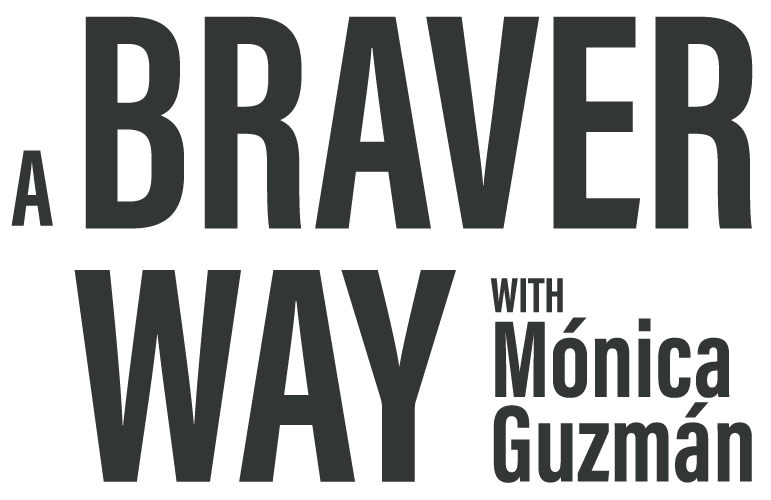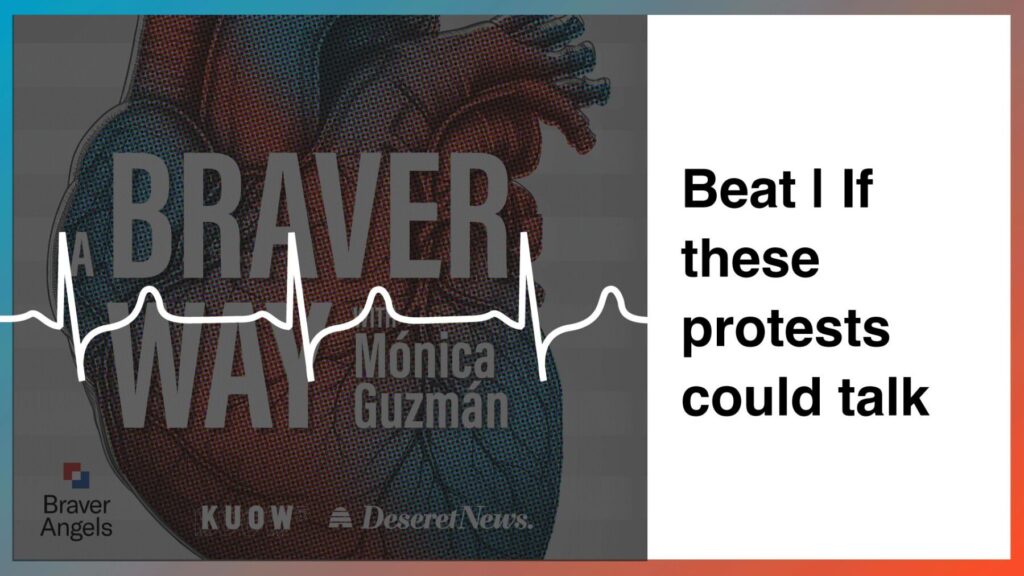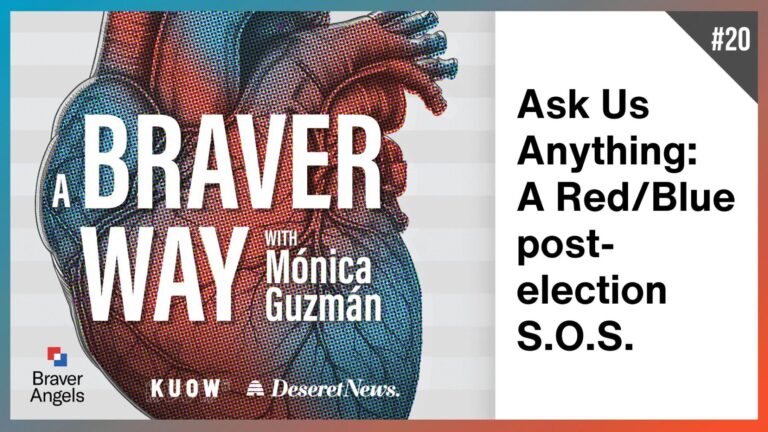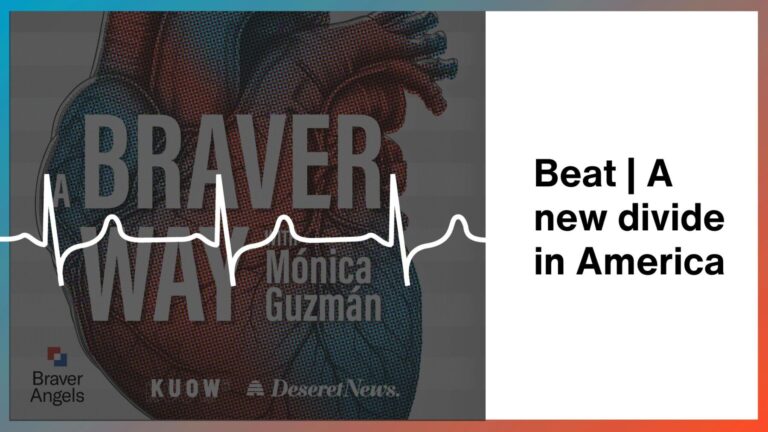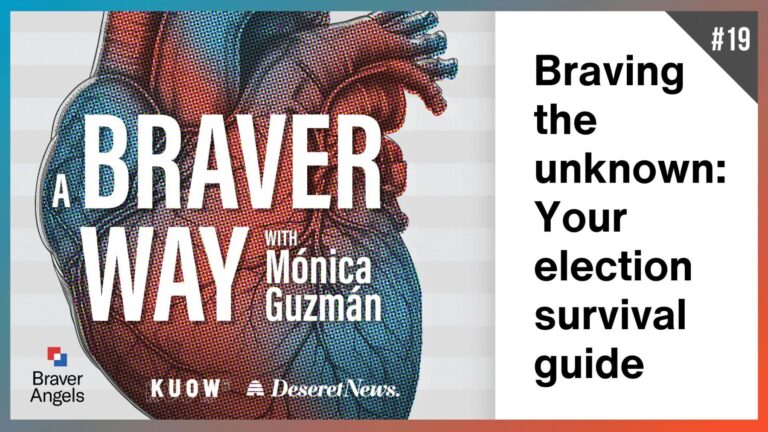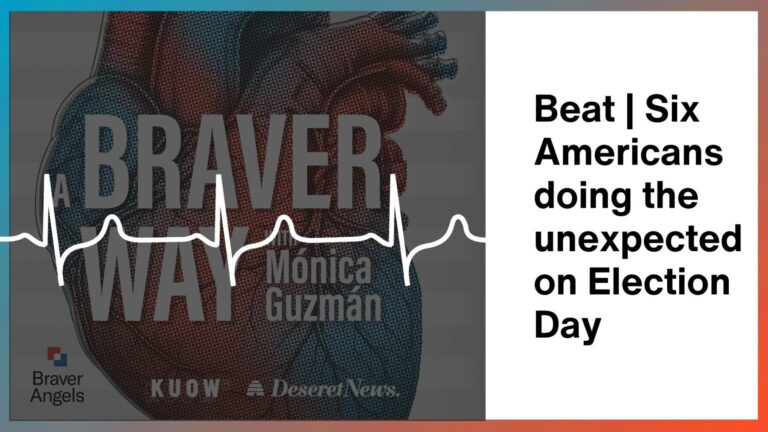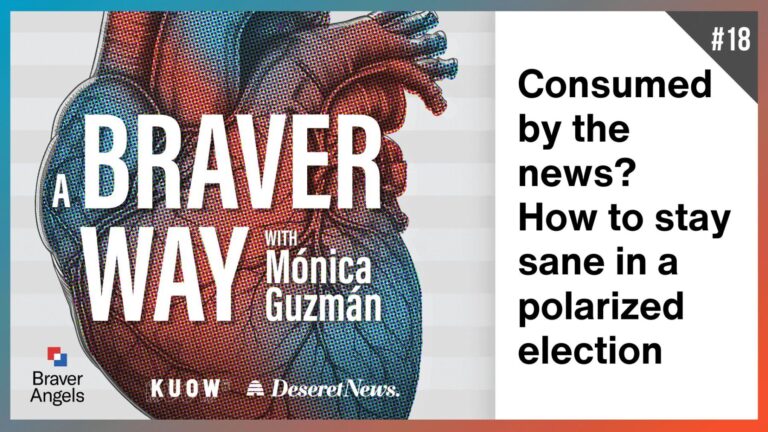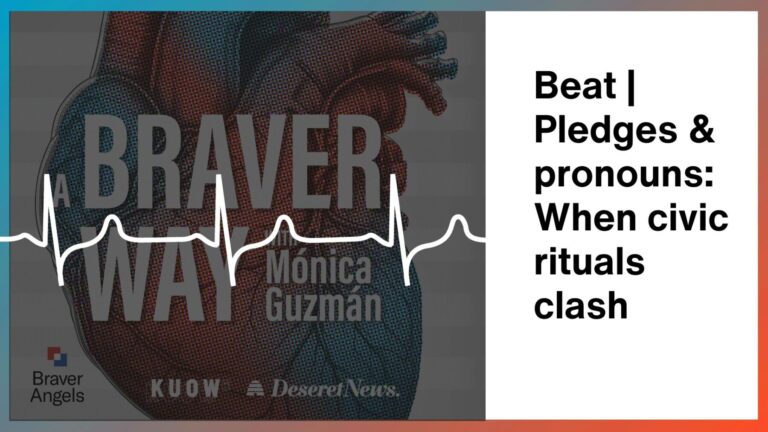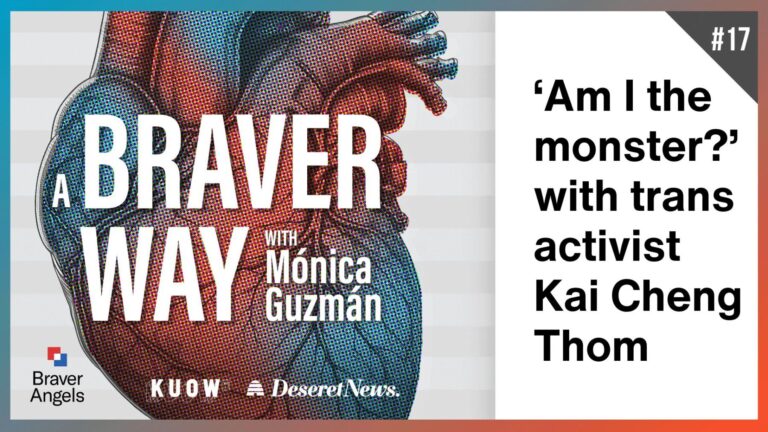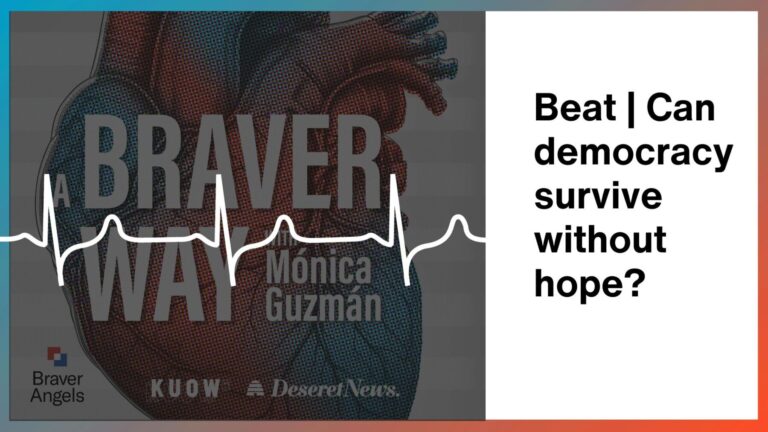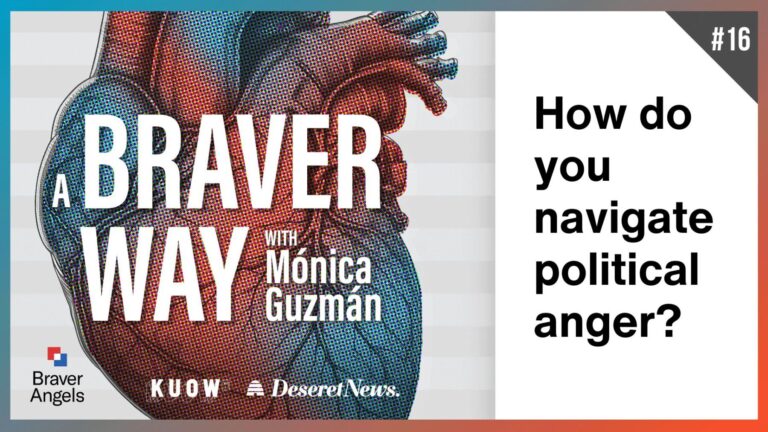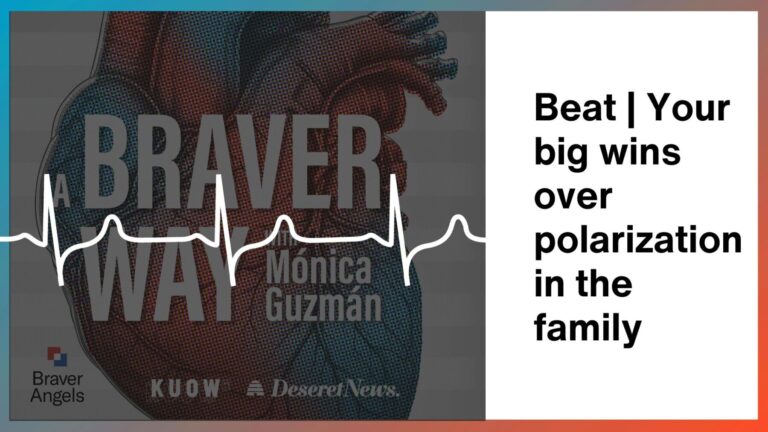Host: Mónica Guzmán
Senior Producer & Editor: David Albright
Producer: Jessica Jones
Artist in Residence: Gangstagrass
Cover Art & Graphics: Katelin Annes
A production of Braver Angels.
Financial Supporters: M.J. Murdock Charitable Trust and Reclaim Curiosity
Sponsors: USAFacts
Media Partners: KUOW and Deseret News
Submit a question: If you’ve found yourself mulling on a concern or reflection as you’ve listened, turn it into a question and share it with us in a quick email to abraverway@braverangels.org.
Subscribe: If you like what you’ve heard, hit subscribe, and leave us a 5 star review!
Share this episode: https://braverangels.org/a-braver-way-beat-episode-7/
Follow us: Instagram | X/ twitter | TikTok | Youtube
Join our text line: Text “brave” to 206-926-9955 to join
Join Braver Angels: Become a Braver Angels member
Set up a 1:1 conversation across the divide: https://braverangels.org/online/1-1-conversations/
Mónica: Guzmán:
This season, we are proud to be partnering with two fantastic media organizations to help us reach more listeners like you. KUOW is Seattle’s NPR News station, and Deseret News is a multi -platform newspaper out of Salt Lake City. Help us by helping them. Learn how at KUOW.org/brave or deseret.com/subscribe.
(music up)
If you want to push for change around a tough political issue, it can feel like you have one of two options. Activism or dialogue. Activism or dialogue.
But as we heard from our guest on last week’s episode, that or can be its own obstacle. I have a huge amount of respect for protest and civil disobedience.
Shira Hoffer:
Just because I’m curious and I like dialogue doesn’t mean that I don’t think that change can be made in that way, but I don’t think that it’s enough. I think sometimes dialogue isn’t sufficient on its own either, by the way, but I think that they are a package deal.
Mónica:
That’s Shira Hoffer, a rising senior at Harvard who created a game -changing hotline for questions about the situation in Israel and Palestine, a painful, heartbreaking conflict where it feels like everyone desperately wants change, but in too many different directions. You can’t move fast on an urgent issue just by talking, but you can’t move smart on an important one just by disrupting, which gets us to the heart of this week’s beat. (music under) Doesn’t talking and acting do more together than a part?
That seems a lot easier for me to imagine if your views on something as volatile as Israel and Palestine are moderate, flexible, maybe a little detached.
But if you’re more firmly on one side of it and you take pride in your convictions and in the change you want to see that many others don’t. Does the package deal still deliver?
Shira, who we talked to last week, is Jewish. Jadd Hashem, who you’ll hear from in a moment, is Palestinian. He’s a student at the University of Texas in Austin and an activist for Palestinian causes. He also, along with his friend Elijah Collenberg, a Jewish UT student, helps lead something called Atidna International. That’s a two year old student organization at UT that brings Jewish and Muslim,Israeli, and Arab students together for regular conversations. Conversations where everyone, regardless of their background or political ideology, is encouraged to say what they really think about one of the hardest set of conflicts anywhere, even after October 7th.
Jadd Hashem:
Hello, my name is Jadd Hashem. I am 20 years old and I am a. Palestinian-American student at the University of Texas in Austin. My father was born and raised in Nablus which is in the heart of the West Bank in Palestine, grew up with 11 siblings alongside his two parents, uh, and grew up under occupation..
Mónica:
Okay, I know we just started, but I want to pause here to zoom in on what Jadd just said.
He said that his dad, quote, grew up under occupation. Now, when I heard that, I realized it’s one of those concepts that I want to make sure I understand, at least on a basic level, to make better sense of everything else.
So, since I was feeling inspired by Shira’s call to notice what I don’t know and ask my questions, I asked. I texted Shira’s hotline and asked what it means to grow up under occupation.
Here’s the response I got, and I quote.
Hi, thanks for the deep and complex question. In 1967, as a result of what has come to be called the Six -Day War, the Israeli military took control of the region called the West Bank, which some Israelis refer to as Judea and Samaria. Since then, Palestinian people who live in this region are subject to Israeli military administration Roads are controlled by military checkpoint, and access to certain areas is limited.
Okay, so with that context, back to Jadd
Jadd.
My father really did have a lot of struggles growing up.
Obviously, when you grow up under occupation, there is a lot of negativity, there is a lot of poverty around you, and it’s not a stable way to live. But my father definitely learned a lot and a lot of that includes the idea of being very grateful for what you have, advocating for nonviolence, mutual understanding, advocating for peace and liberation, but doing so in a manner where we’re not putting other people’s lives at risk.
Especially with my father being so close with his family growing up, sort of the idea that family is very important. And the way that I’ve kind of transferred that message is I believe very thoroughly as a Palestinian that the Jewish people and the Israeli people are our brothers and sisters. And naturally, when we consider them to be a part of our family, it becomes much more difficult to see them as the quote -unquote other. And, you know, certainly my father and I don’t agree on everything.
Even in regards to Israel -Palestine, we don’t agree on everything. And That’s kind of the beauty of how the world works, right? And so, you know, my father and my parents in particular have always emphasized to me critical thinking, education, but also dialogue and compassion, right? Doing so where we are being kind to one another and empathetic and doing so in good faith.
That day, October 7th, I remember, it was a Saturday morning, and right away, like many of us, there was news that there were attacks in Israel, that basically Hamas fighters had went in and had killed what we had thought maybe at the time was a few hundred Israelis, turned out to be closer to 1,100 to 1,200.
As many universities had, we had protests, although we did not have encampments, I should specify, at UT Austin. But, you know, we saw escalations on campus. And what we found, especially in our organization, was that many Israeli or more Zionist students felt that they couldn’t speak with Palestinians because there was a potential for justifying terrorism.
And what we found is that there were many Palestinian students who said, you know, I don’t want to normalize Israel as an apartheid or as a blockading state. And quickly, we found that many people were obviously very divided. Yet, we found there were also many people who wanted to step up and have dialogue. Many people who had never spoken to the quote -unquote other before.
You know, I had, I would say, a fair amount of Jewish peers growing up, but I never really engaged that much with the Jewish community or Israelis. I’ve done a lot more now in the last 10 months that I had probably done in the prior 10 years.
So, I have a Jewish friend who’s a part of Atitna, and he is somebody who was not at the campus protests, and he was somebody who felt very weary about them. He is somebody who is especially cautious of phrases like “from the river to the sea,” which is a very common Palestinian chant that is used. As a Palestinian, I always thought the chant to basically mean equality for all people between the Jordan River and the Mediterranean Sea,
And that there would be basically a Palestinian state where all people, Arabs, Jews, Muslims, Christians, atheists, whatever, would be able to live in that state. And that includes the Israelis who live there.
They would just be considered Palestinian or they would be considered basically Jewish Palestinians, right? And they get still full equal rights. What a lot of Jewish people will say, however, is that the phrase is inherently anti -Semitic because it calls for the dismantling of Israel, which then for a lot of people is following up with the idea that Jews are to basically be expelled into the Mediterranean and to other countries.
And, listen, considering how Jewish history has unfolded, It’s not surprising to think that it could easily be seen as an attack. Um, and so when I talked to my friend about this, and we discussed what the phrase meant, I shared my views, and he shared his. And, he actually, by the end of the conversation, really said, you know, I never even really thought of it that way, but honestly, you know, the way you mention it, I don’t really know if I would consider it anti Semitic, but it’s very interesting to see how simple dialogue like that, which probably is then followed up by some research and some history, , can change somebody’s mind, you know, what I will tell people, and. I tell Palestinians this a lot is words like Zionism, for example, I would not die on the hill when it comes to talking about it, because Zionism is not our term. And if we say Zionism or we say “from the river to the sea,” we may think we know what we’re talking about, but perhaps other people don’t. And they won’t understand simply by a protest. You have to talk. And Palestinians may not understand Jewish history or Israeli history without that conversation.
And so, I just encourage people to understand that there is nuance in almost anything we do in life and that protesting is great, but dialogue is absolutely necessary.
(music under)
And you cannot get away with it. You cannot even change people’s opinions, frankly, if you’re not going to have dialogue.
Mónica:
One month, after October 7th, Jadd and Elijah’s student organization took action in a pretty unique way. They hosted a vigil at the University of Texas for all the people on both sides of the conflict who’d lost their lives. A rabbi spoke as well as an imam. And in a video that I saw from the event, I noticed there was this homemade banner behind the speakers. And it said, one family mourning together.
This spring, Jadd and Elijah took action again. Pro -Israel and pro -Palestinian students were out in full force on UT’s campus, and the two set up a dialogue space right between them. They brought a table, some chairs, and this sign that said, “One Palestinian, one Jew, two brothers. Ask us anything.”
Family. Brothers. Why am I highlighting this? Because next week on this podcast, we’re going to pivot to another would -be battleground where I know a lot of you feel heartbreak around political difference.
(music under)
And that is your family. If you like me are in a politically divided family and you have managed to repair some small part of a relationship that was weighed down by that, with your son or mom or grandpa or cousin, or if you’ve managed to learn something valuable from a political conversation with a relative on the other side, even a little thing. I would love to hear it so that so many others out there who are looking for hope here can learn from it.
Would you send me your story? Two ways to do it. They’re both easy and you can keep it so simple. Please do like a quick chat among friends. You can email me at abraverway@braverangels.org.
Or you can text me about it. Just text the word brave to 206 -926 -9955 to join our text line. Then catch me up. Two sentences is fine, and I so don’t mind typos. I’m looking for stories, not polish, not perfection. Why? Because if I’ve learned anything doing this work, it’s that the most memorable and sometimes impactful wisdom for how to hear and be heard by people who confound you doesn’t come from the experts. It comes from each other.
(music out)
And with that, thank you all so much for joining us for this beat episode of A Braver Way A Braver Way. A Braver Way is produced by Braver Angels and distributed in partnership with KUOW and Deseret News.
We get financial support from the MJ Murdoch Charitable Trust and reclaim curiosity and count USA Facts as a proud sponsor.
Our senior producer and editor is David Albright. Our producer is Jessica Jones. Our theme music is by the fantastic number one Billboard bluegrass charting hip hop band Gangstagrass.
A special thank you to Ben Caron, Don Goldberg, Gabbi Timmis, and Katelin Annes. I’m your host and guide across the divide, Mónica Guzmán.
If you want to share your story, your thoughts, please do. I always love to see them. You can always reach us at a braver way at abraberway@braverangels.org or join our text line by texting the word BRAVE to 206 -926 -9955.
Take heart, everyone. Till next time.
(music out)
Braver Angels is the nation’s largest cross-partisan volunteer-led movement to bridge the political divide and the organization that produces this podcast.
And here’s the exciting part. You can join us in our mission to overcome toxic polarization and strengthen our Democratic Republic. Head to braverangels.org/join to become a member and support our growing movement.
And let them know A Braver Way sent you.
